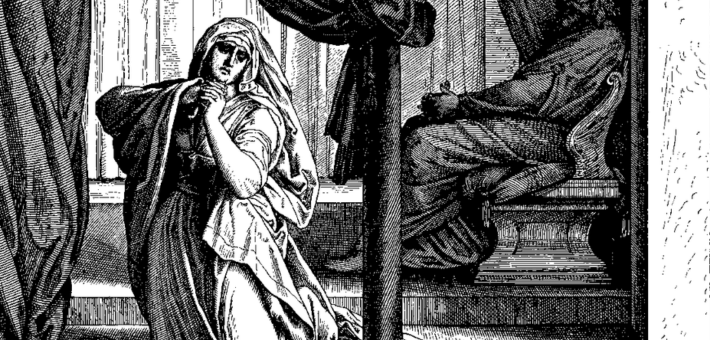Commentary on 1 Samuel 1:4-20
First Samuel 1 introduces Hannah, among other characters who appear more privileged and powerful than her. For example, her husband Elkanah has two wives and several children, both male and female, who belong to his other wife Peninnah. In addition to references to Elkanah’s relatives, three other men are introduced: Eli and his sons Hophni and Phinehas, who are all priests. We know that Elkanah is economically advantaged because when he offers sacrifices, he gives portions to his wives and children. He even gives double portions to Hannah because she is barren.
Hannah’s story is one of incredible faith amid incompetent “leadership.” She lives in a patriarchal society dominated by men who both rule in the household and lead in the temple. In such a context, she is aware that her livelihood and ability to thrive are dependent upon her attachment to men through marriage and/or as the mother of a male son, which she lacks. Persistent provocation and irritation by her husband’s other wife, who is described as Hannah’s rival (1:6), intensifies the disappointment, pain, and perhaps even shame of Hannah’s experience of barrenness. Peninnah bullies Hannah year after year, which drives Hannah to weep and refuse to eat (1:7).
Before and in response to Hannah’s weeping and food refusal, readers get a glimpse into incompetent leadership by both Elkanah and Eli. One would imagine that Elkanah undoubtedly knows that Hannah is taunted by his other wife and senses that her deity-caused experience of infertility is a deep source of pain for her, yet he poses a series of questions to her: “Hannah, why do you weep? Why do you not eat? Why is your heart sad? Am I not more to you than ten sons?” (1:8).
First, he attempts to alleviate Hannah’s pain by giving her a double portion of the sacrifice, as if his “gifts” could remedy the pain of her inability to produce a child and as if the sacrificed portions could provide Hannah lasting economic security. Economic security seems to be a tenacious concern raised in Hannah’s song in the second chapter as she spotlights and asserts the reversal of fortune for the oppressed and downtrodden. Elkanah is prosperous, and he uses his wealth as a tool to address her distress, which illustrates ineffectiveness in identifying and addressing her needs. He asks why she weeps, knowing his other wife antagonizes her because she does not have children, yet he does nothing to intervene, thereby enabling Peninnah to torment and terrorize Hannah.
Elkanah’s last question is further evidence of his ineptitude. He asks Hannah, “Am I not more to you than ten sons?” Elkanah knows the value of sons in patriarchal contexts such as his. His question displays his willful downplay of her vulnerability and concern about the need for security should something happen to him. Elkanah offers Hannah gifts and is depicted as speaking “tenderly” to her, yet neither his actions nor his words assuage her pain. She is deeply distressed and distraught, yet Elkanah ceases speaking to her after this set of rhetorical questions. He becomes silent and turns to eating and drinking (1:9).
Afterward, Hannah rises and presents herself to the Lord. She continues to weep as she prays, which is indicative that Elkanah’s actions and support are ineffective. She is still deeply affected by her perceived hardships.
When Hannah presents herself to the Lord, the priest Eli, who is seated beside the doorpost of the temple, observes her mouth as she is praying and perceives she is drunk. It seems he is at a distance and can see her lips moving but cannot hear anything. He presumes that her moving lips are a sign of drunkenness, not a posture of prayer and gesture of petition.
Eli assumes before he asks a question for clarity, which is a sure sign of incompetence as a leader. Further, he endeavors to publicly shame her by rebuking her. But when she corrects him by indicating that she was “pouring out [her] soul before the Lord,” shame is brought upon him through the exposure of his physical, intellectual, and spiritual ability to perceive that she was communicating with God.
Not only does Hannah correct Eli, but she does so reflecting brilliance and rhetorical prowess, using a wine metaphor to express her mode of communication with the Lord and to juxtapose her actions with those of her husband and others. She fasts and pours out her soul before God while her husband and others eat, pouring out and consuming wine after sacrificing to God. She sets herself apart by abstaining from wine so that her presentation of herself to God will be pleasing. Further, she vows to commit her son, if she is blessed with one, as a Nazirite who, like her, will abstain from wine and intoxicants. In doing so, she aligns her future child’s identity with hers, marked by a dedication to address and transform the lives of the needy and poor.
Hannah’s incredible faith during sadness, anxiety, and vexation for a son who would later become a great leader stands in stark contrast to the incompetent leadership of her husband and the priest. She was deeply troubled, which was undoubtedly intensified by the perceptions and actions of Elkanah and Eli, but she allowed her faith to “trouble” their incompetent leadership so that her turmoil, vexation, and anxieties could be transformed into peace.


November 17, 2024